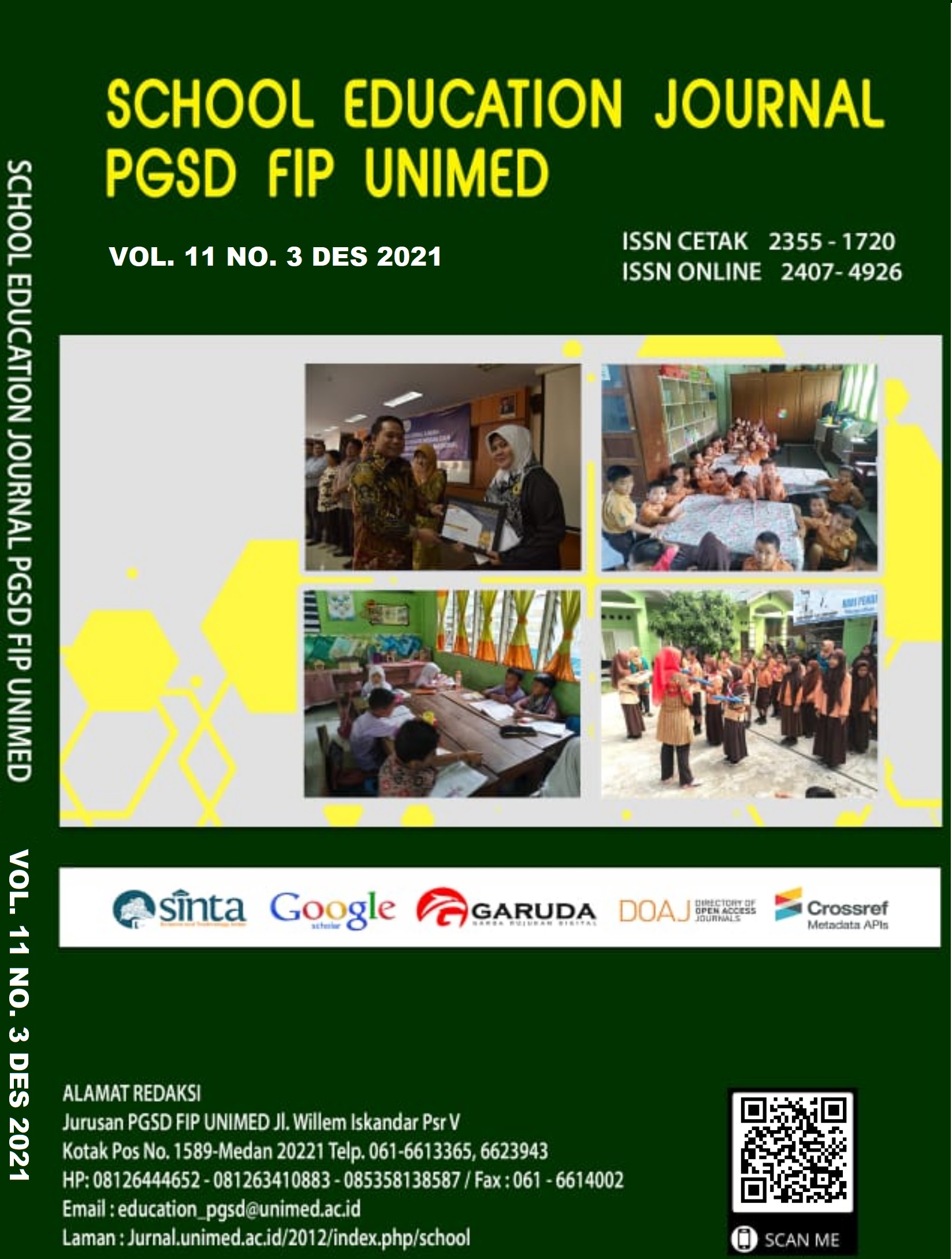PENGARUH MODEL PEMBELAJARAN KONTEKSTUAL TERHADAP KEMAMPUAN KOMUNIKASI MATEMATIS SISWA SEKOLAH DASAR
DOI:
https://doi.org/10.24114/sejpgsd.v12i3.40004Keywords:
Influence, Contextual Learning Model, Mathematical Communication AbilityAbstract
This research is motivated by the low mathematical communication ability of students in expressing ideas and relating the knowledge students have to real situations. This study aims to determine the contextual learning model influences students' mathematical communication ability better than the direct learning model. This research is a quasi-experimental research. The population of this study were all fourth grade students at SDN 050660 Kwala Bingai, Stabat, which consisted of three parallel classes with a total of 89 students. The sampling system used was cluster random sampling with classes IVA and IVB classes being sampled. Class IVA as the control class consisted of 30 students and class IVB as the experimental class consisted of 27 students. Data analysis was performed by two-way analysis of variance (ANOVA). The results showed that the contextual learning model had a better effect on students' mathematical communication abilities compared to the learning model. This shows that the contextual learning model provides a good change in developing students' mathematical communication ability.References
Ariawan, R., & Nufus, H. 2017. Hubungan Kemampuan Pemecahan Masalah Matematis dengan Kemampuan Komunikasi Matematis Siswa. Jurnal THEOREMS (The Original Research of Mathematics). Vol. 1.,No. 2, hal. 82-91.
Firmansyah, A., Hasanuddin dan Nelson, Z. 2018. Pengaruh Model Pembelajaran Contextual Teaching and Learning terhadap Kemampuan Komunikasi Matematis berdasarkan Pengetahuan Awal Siswa Madrasah Tsanawiyah. Juring (Journal for Research in Mathematics Learning). P-ISSN:2621-7430. E-ISSN:2621-7422. Vol. 1, No. 1. 1-10.
Hosnan, M. 2014. Pendekatan Saintifik dan Kontekstual dalam Pembelajaran Abad 21 Kunci Sukses Implementasi Kurikulum 2013. Bogor: Ghalia Indonesia.
NCTM. 2000. Principles and Standarts for School Mathematics. Reston VA: The National Council of Teachers of Mathematics Inc.
Purba, D. N., Sipakkar, T. R., Tambunan, H., Sinaga, S.J., Naibaho, T. 2022. Pembelajaran dengan Model Contextual Teaching and Learning (CTL) Terhadap Pemahaman Matematis dan Kemampuan Komunikasi Siswa pada Materi Segitiga. Journal of Mathematics Education and Applied. E-ISSN: 2686-4452.
Qomario. 2018. Pengaruh Hypnoteaching Dalam Contextual Teaching And Learning Terhadap Kemampuan Komunikasi Matematis. Refleksi Edukatika: Jurnal Ilmiah Kependidikan Volume 9 Nomor 1 Desember 2018 ISSN: 2087-9385 (print) dan 2528-696X (online). http://jurnal.umk.ac.id/index.php/RE.
Sabroni, D. 2017. Pengaruh Model Pembelajaran Contextual Teaching And Learning (CTL) Terhadap Kemampuan Komunikasi Matematis Siswa. Lampung: Prosiding Seminar Nasional Matematika dan Pendidikan Matematika 2017 UIN Raden Intan.
Sembiring, Rony 2020. Eksistensi Media Dalam Pembelajaran Melalui Media Sosial Dan Media Audiovisual Di Fakultas Keguruan Dan Ilmu Pendidikan (Fkip) Universitas Prima Indonesia. School Education Journal, Vol. 10 No. 4 Desember 2020, doi: https://doi.org/10.24114/sejpgsd.v10i4.19876.
Tambunan, H. 2021. Dampak Pembelajaran Online Selama Pandemi Covid-19 Terhadap Resiliensi, Literasi Matematis Dan Prestasi Matematika Siswa. JPMI: Jurnal Pendidikan Matematika Indonesia, 70-77.
Downloads
Published
Issue
Section
License
Authors whose manuscripts are approved are approved as follows:
The publication rights for all journal manuscript materials published/published on the SEJ (School Education Journal) E-Journal site are held by the editorial board with the author's knowledge (moral rights remain with the manuscript authors).
The formal legal requirements for accessing this electronic digital journal article are subject to the terms of the Creative Commons Attribution-ShareAlike (CC BY) license, which means that E-Journal SEJ (School Education Journal) has the right to store, transfer media/format, manage in the form of a database, maintain, and publish articles without asking permission from the author as long as the author's name remains as the copyright owner.
Manuscripts published/published electronically are open access for educational, research, and library purposes.

